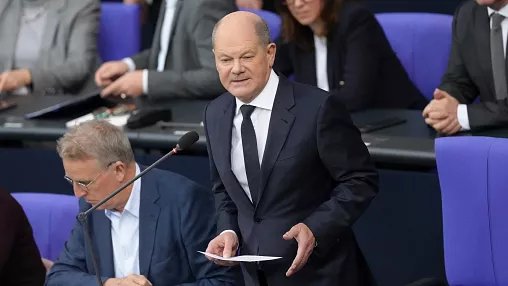Berlin, April 27, 2024 – German Chancellor Olaf Scholz has officially rejected calls to send German peacekeeping troops to Ukraine, citing strategic, logistical, and diplomatic considerations. This decision comes amid ongoing tensions and the international community’s efforts to stabilize the region.
Scholz’s Statement and Rationale
In a press conference held today, Chancellor Scholz addressed the proposals to deploy German military forces to Ukraine as part of a broader peacekeeping mission. He emphasized Germany’s commitment to supporting Ukraine through economic aid and diplomatic channels but underscored the complexities involved in deploying troops.
“We remain steadfast in our support for Ukraine’s sovereignty and territorial integrity,” Scholz stated. “However, sending peacekeeping troops involves significant logistical challenges and strategic implications that we must carefully consider. Our priority is to ensure that any action we take contributes effectively to long-term stability and peace.”
Political and Public Reactions
The Chancellor’s decision has elicited mixed reactions within Germany. Supporters argue that Scholz is making a prudent choice by avoiding further militarization, which could escalate tensions and complicate diplomatic relations with Russia. They highlight Germany’s role in providing humanitarian aid and facilitating negotiations as more constructive approaches.
Conversely, critics contend that Germany should take a more active role in peacekeeping efforts to demonstrate solidarity with Ukraine and deter further aggression. Some political factions have called for a reevaluation of the decision, suggesting that military support could bolster Ukraine’s defense capabilities and contribute to regional security.
Implications for Germany-Ukraine Relations
Scholz’s refusal to send peacekeeping troops does not signal a withdrawal of support for Ukraine. Instead, it reinforces Germany’s strategy of leveraging economic and diplomatic tools to aid Ukraine. Germany continues to supply military equipment, financial assistance, and technical expertise to help Ukraine strengthen its defenses and rebuild infrastructure.
Additionally, Germany is working closely with NATO allies and the European Union to coordinate a unified response to the conflict. Scholz emphasized the importance of multilateral efforts in achieving sustainable peace and preventing further destabilization in Eastern Europe.
International Perspective
Internationally, Scholz’s decision has been met with both understanding and concern. Allies within NATO have largely supported Germany’s cautious approach, recognizing the need for a balanced strategy that avoids unnecessary escalation. However, some international observers worry that the absence of a direct military presence might limit the effectiveness of peacekeeping initiatives in Ukraine.
Experts suggest that Germany’s focus on diplomatic and economic measures could serve as a model for non-military support in conflict resolution. By prioritizing dialogue and cooperation, Germany aims to contribute to a peaceful resolution without exacerbating the situation through military involvement.
Future Steps and Ongoing Support
Looking ahead, Chancellor Scholz assured that Germany remains committed to finding a peaceful solution to the conflict in Ukraine. The government plans to continue its support through various channels, including humanitarian aid, economic sanctions against aggressors, and diplomatic negotiations aimed at achieving a lasting peace.
“We are dedicated to exploring all avenues that promote peace and stability,” Scholz affirmed. “Our efforts will remain focused on constructive and effective measures that support Ukraine and contribute to a secure and peaceful Europe.”
